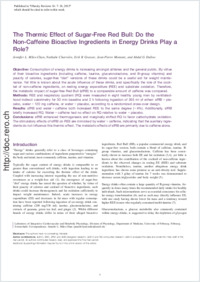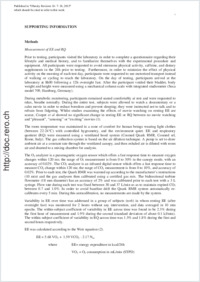The thermic effect of sugar-free Red Bull: Do the non-caffeine bioactive ingredients in energy drinks play a role?
- Miles-Chan, Jennifer L. Laboratory of Integrative Cardiovascular and Metabolic Physiology, Department of Medicine, University of Fribourg, Switzerland
- Charrière, Nathalie Laboratory of Integrative Cardiovascular and Metabolic Physiology, Department of Medicine, University of Fribourg, Switzerland
- Grasser, Erik Konrad Laboratory of Integrative Cardiovascular and Metabolic Physiology, Department of Medicine, University of Fribourg, Switzerland
- Montani, Jean-Pierre Laboratory of Integrative Cardiovascular and Metabolic Physiology, Department of Medicine, University of Fribourg, Switzerland
- Dulloo, Abdul G. Laboratory of Integrative Cardiovascular and Metabolic Physiology, Department of Medicine, University of Fribourg, Switzerland
-
01.01.2015
Published in:
- Obesity. - 2015, vol. 23, no. 1, p. 16–19
English
Objective: Consumption of energy drinks is increasing amongst athletes and the general public. By virtue of their bioactive ingredients (including caffeine, taurine, glucuronolactone, and B-group vitamins) and paucity of calories, sugar-free “diet” versions of these drinks could be a useful aid for weight maintenance. Yet little is known about the acute influence of these drinks, and specifically the role of the cocktail of non-caffeine ingredients, on resting energy expenditure (REE) and substrate oxidation. Therefore, the metabolic impact of sugar-free Red Bull (sfRB) to a comparable amount of caffeine was compared.Methods: REE and respiratory quotient (RQ) were measured in eight healthy young men by ventilated-hood indirect calorimetry for 30 min baseline and 2 h following ingestion of 355 ml of either: sfRB + placebo, water + 120 mg caffeine, or water + placebo, according to a randomized cross-over design.Results: sfRB and water + caffeine both increased REE to the same degree (+4%). Additionally, sfRB briefly increased RQ. Water + caffeine had no effect on RQ relative to water + placebo.Conclusions: sfRB enhanced thermogenesis and marginally shifted RQ to favor carbohydrate oxidation. The stimulatory effects of sfRB on REE are mimicked by water + caffeine, indicating that the auxiliary ingredients do not influence this thermic effect. The metabolic effects of sfRB are primarily due to caffeine alone.
- Faculty
- Faculté des sciences et de médecine
- Department
- Médecine 3ème année, Département de Médecine
- Language
-
- English
- Classification
- Dietetics, nutrition
- License
-
License undefined
- Identifiers
-
- RERO DOC 235596
- DOI 10.1002/oby.20905
- Persistent URL
- https://folia.unifr.ch/unifr/documents/304240
Other files
Statistics
Document views: 157
File downloads:
- pdf: 308
- Supplementary material: 146

